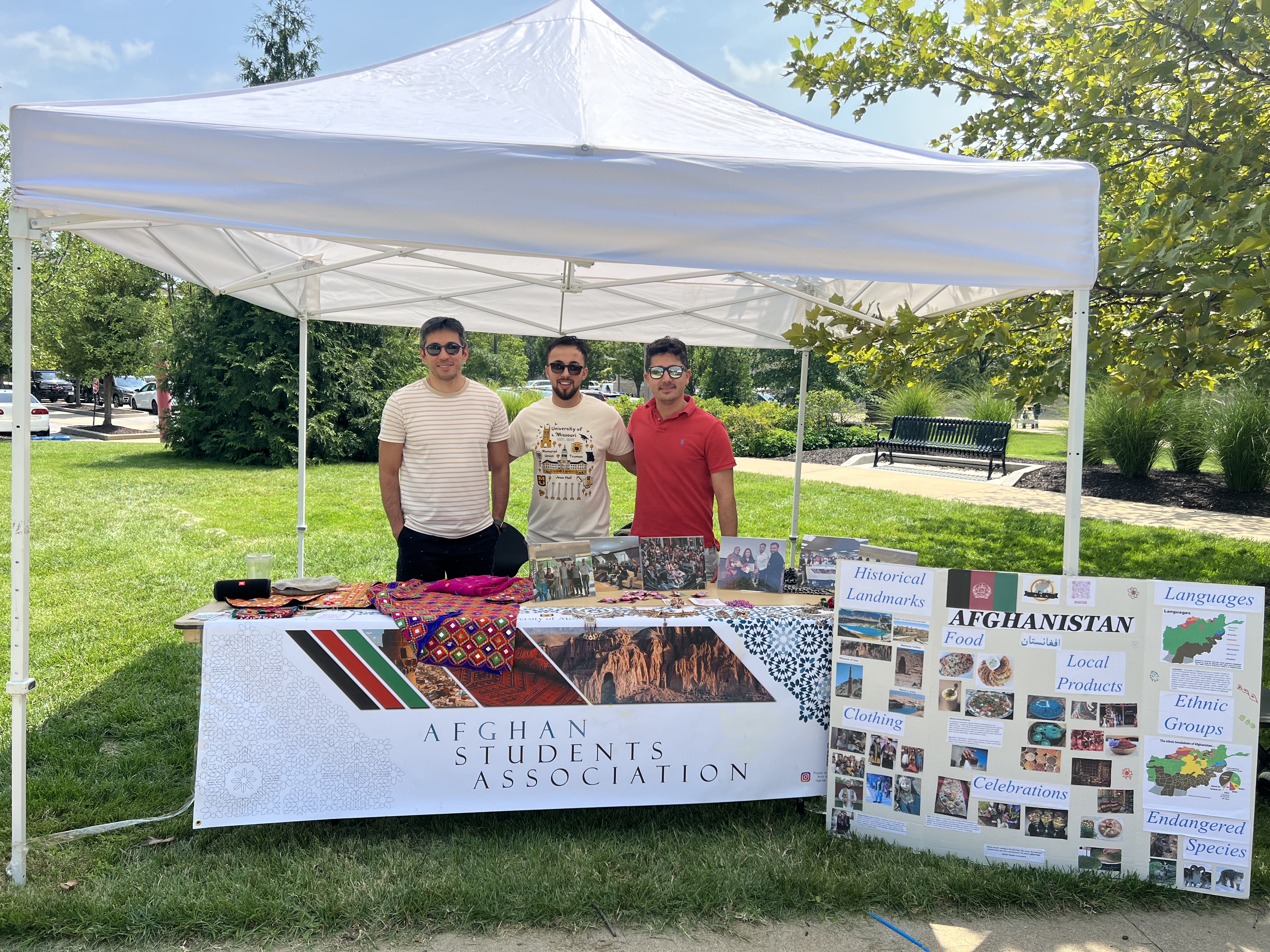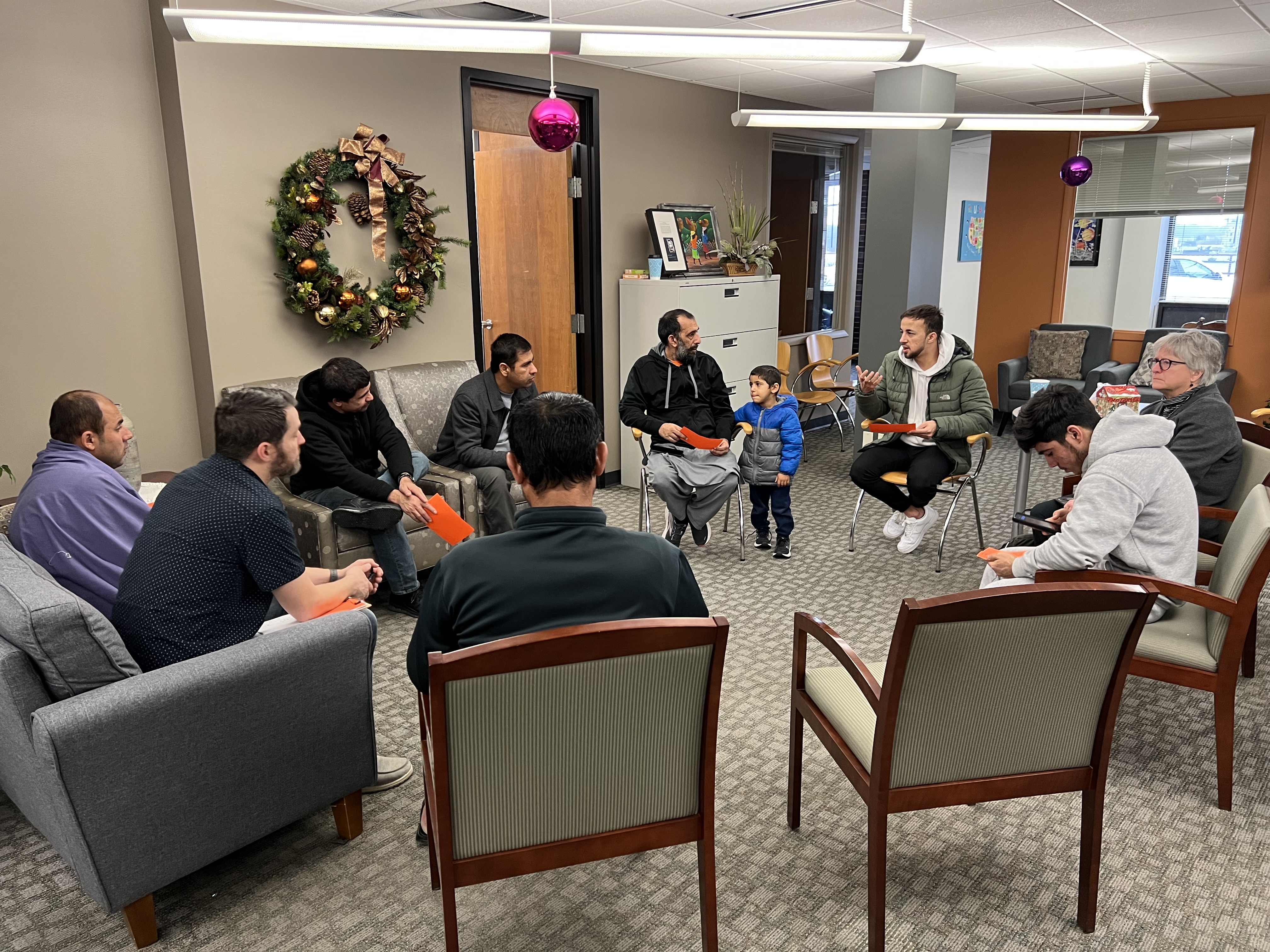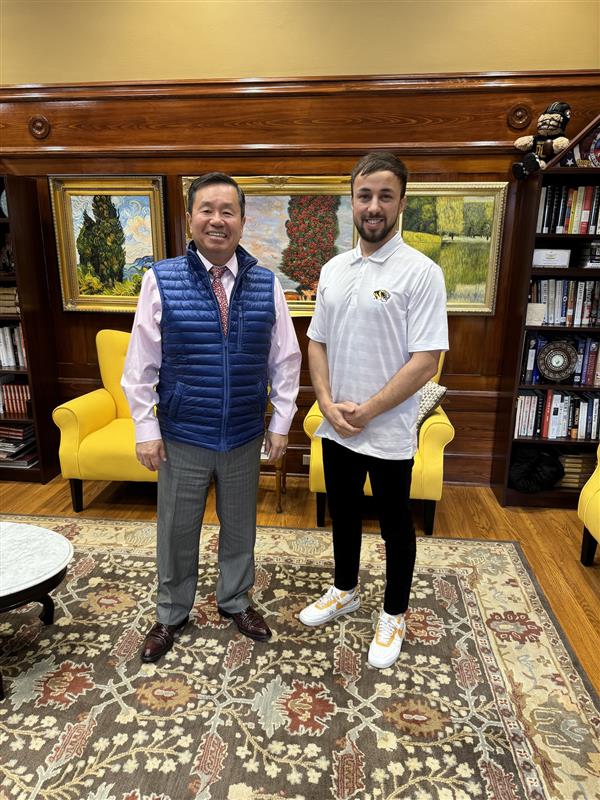Whole new world: Afghan student turns challenges into opportunities at Trulaske
Sayed Zabiullah Sadat hopes to one day return to Afghanistan and use the leadership skills he has developed at the Trulaske College of Business to make a difference in his home country.
Sayed Zabiullah Sadat had $70 and a small bag of clothes when he arrived in Columbia, Missouri on Jan. 12, 2022. It was cold and the exhausted 22-year-old, who had just escaped the Taliban in his home country of Afghanistan, didn’t own a winter coat.
Sadat had come – thanks to a scholarship from the Institute of International Education (IIE) – to attend the University of Missouri, where he planned to continue his studies in business.
His harrowing weekslong journey from Afghanistan to Qatar to Iraq to the United States had finally landed him at Mizzou, where today, he is president of the Afghan Student Association and poised to graduate Sunday with a degree in business administration with an emphasis in management from the Robert J. Trulaske, Sr. College of Business.
Though he has not seen his family in more than two years, Sadat has found a home at Trulaske and the greater Columbia community, where strangers have become family and challenges have become opportunities.
“My Trulaske professors taught me that in order to achieve great things in my life, I need to take risks and get out of my comfort zone,” he said. “I have very much been out of my comfort zone these last two years.”

LIFE IN AFGHANISTAN
Sadat grew up the second oldest in a family of six children – three boys and three girls – in Kabul, the nation’s capital. His mom stayed at home with the children while his dad worked for the World Food Programme, an international organization within the United Nations.
Growing up, Sadat was especially close with his older brother, whom he followed to the American University of Afghanistan (AUAF) in Kabul to take courses in English. He was 17 when the Taliban attacked the campus in 2016, killing more than a dozen people. Though Sadat and brother survived the nine-hour siege, the experience was deeply traumatizing.
“It was a nightmare to see people losing their lives right in front of me,” Sadat recalled.
Despite the attack, Sadat and his family knew that an education at AUAF would secure a better future for him; so, he continued his studies there until the Taliban took control of the country in 2021. Overnight, Afghanistan spiraled into chaos. Because of his ties to AUAF and relationships with Americans, Sadat was forced into hiding. For two months, he hid from the Taliban until he could escape, eventually arriving in Iraq, where he applied for a visa in hopes of coming to America.
“It was very stressful, waiting in line to apply for a visa,” Sadat said. “Five students in front of me were interviewed and rejected. I was so nervous, wondering what I would have to say to convince them. I had 15 minutes with four or five questions to make my case.”
Days later, Sadat walked onto the Mizzou campus.
FINDING HIS WAY
At first, he was overwhelmed with the size of the university community.
“It was like a city to me,” Sadat said. “I wondered, ‘How am I going to find my way around?’”
There were other challenges, too, like adjusting to a new culture, new food and the cold weather, not to mention missing his family and worrying about their safety. The Taliban had already been to his family’s home and put restrictions on their activities since his escape.

But Sadat managed to settle in, first rooming with two Mizzou students, one of whom took him under his wing and patiently introduced him to an American way of life. He also found other Afghan refugees through Columbia’s City of Refuge, where he taught English, served as an interpreter and connected people new to the country to services.
“I became a bridge between two cultures,” Sadat said. “It helped me to give back.”
He also landed a summer internship with Shelter Insurance and later, a part-time job as a program assistant at MU’s Office of Service Learning, where he continues to work.
Still, there was always that underlying current of fear about his family’s safety that often made studying difficult. He credits Graham McCaulley, director of MU’s Office of Service Learning; Lauren Brengarth, Trulaske’s assistant dean of student programs; and Tim Hill, an assistant teaching professor at Trulaske, with keeping him on track.
Hill said Sadat is among the most generous students he’s ever met.
“I’ve truly enjoyed having Sayed as a student and count him as a friend,” Hill said. “He’s one of the most thoughtful and grateful students I’ve worked with and always reminds me to approach life with that same gratitude. He sees value and worth in every person he meets. I don’t know that it’s possible to meet Sayed without feeling like you’ve been invited into his family.”
Brengarth said Sadat always had a way of giving back and often stopped by her office to say hello. In the spring of 2023, when Sadat was in her BA 3500 class, he recognized her on International Women’s Day, a gesture that reminded her of the opportunities she has enjoyed.
“He gave me a card and said that he and his whole family wanted to share their appreciation for what I do,” she said. “I’ve never had anyone do anything like this. It caused me to pause and reflect on the many blessings we have in the U.S. and how so many others – especially women – do not have the freedoms we often take for granted.”
Sadat also received support from Mizzou’s programs for international students and the friends he met through the Afghan Student Association. He is especially grateful to his former Trulaske advisor Stephanie Toigo, whose support and guidance helped him feel safe in a whole new world.
“She was like a mom to me in America and was very supportive,” he said. “She gave me a feeling of a family here.”
Sadat’s journey to Mizzou would not have been possible, he acknowledged, without the support years ago from Kenneth Holland, former president of the American University of Afghanistan, and his wife, Julie Holland.
“They were instrumental in assisting me during a profoundly challenging period in my life,” he said. “Their efforts were key in my safe departure from Afghanistan.”

GOING FORTH
Hill said one of the characteristics he appreciates most about Sadat is his lack of complacency.
“If there is a problem, he wants to solve it. If someone needs help, he will be the first to offer,” Hill said. “When he learns something new, he finds someone to share it with or some way to apply it – and when we don’t approach problems in the same way, he doesn’t understand it. Sayed has a hunger to learn and grow because he knows there’s a need for capable, innovative leaders.”
In April, Sadat was recognized as one of this year’s Tru20 students, recognized for their stories about how Trulaske has impacted their lives.
Currently, Sadat is working to enroll in graduate school at Mizzou or another university. Once there is a regime change in Afghanistan, Sadat hopes to return home and serve as a leader in his country.
“I have learned so much about leadership and how to build and develop a community,” he said. “I want to go home and serve others in an effective way.”
While at Mizzou, Sadat has also learned the power of patience and resilience – and more importantly, the power of kindness.
“So many Americans have been very kind to me. I want to be supportive of others like Americans have been to me,” he said. “Whatever you do will come back to you.”